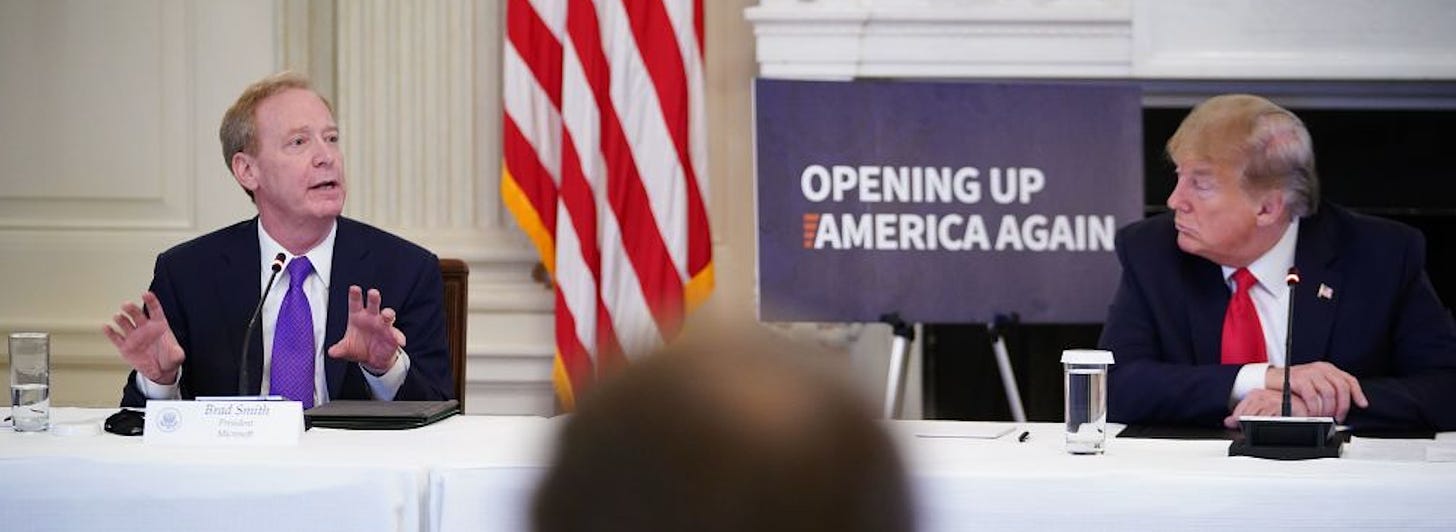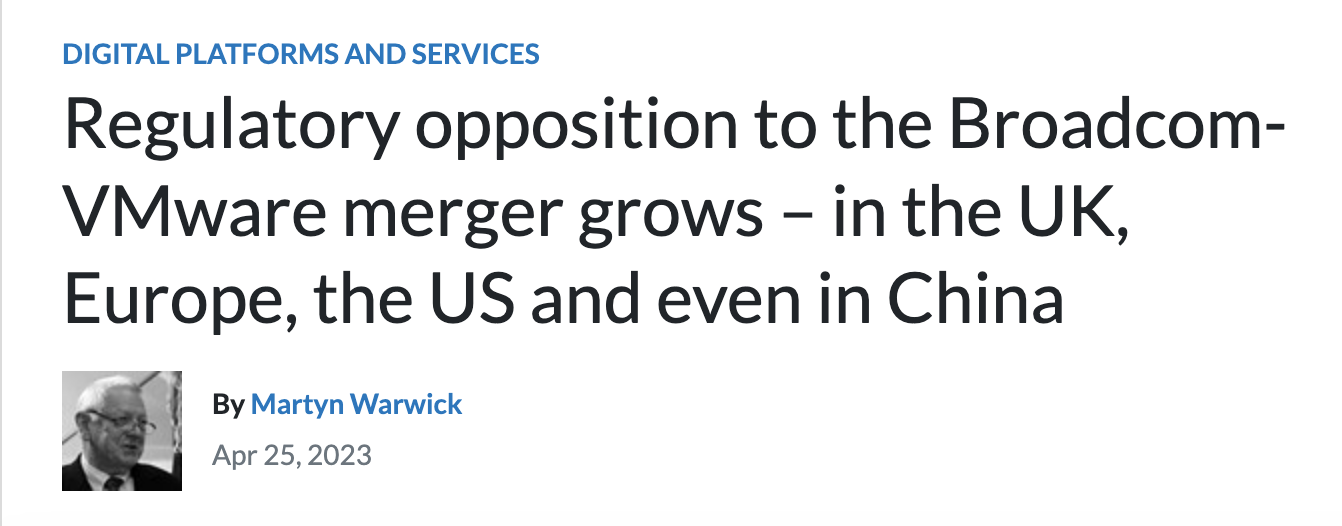Big Tech Blocked: Microsoft Stopped from Taking Over Gaming
Anti-monopolists at the UK's Competition and Markets Authority prevented the consolidation of gaming. And in doing so, they are creating a very different future.
Welcome to BIG, a newsletter on the politics of monopoly power. If you’re already signed up, great! If you’d like to sign up and receive issues over email, you can do so here.
Today I’m writing about the UK’s Competition and Markets Authority’s move to block Microsoft’s takeover of Activision in a $69 billion deal. It’s hard to overstate the importance of this challenge, and I’m going to focus on the logic of the CMA, and what it means for the development of technology going forward.
Here’s what happened. Microsoft was trying to buy Activision to expand its gaming portfolio, which it had rolled up with a series of acquisitions. Activision would have been its largest purchase to date. What was the rationale for the acquisition? As I wrote when the deal was announced:
Activision has important gaming franchises, like Call of Duty, Candy Crush, Warcraft and Tony Hawk. With this purchase, Microsoft will be the third biggest gaming firm in the world, controlling the X-Box console platform and a lot of game development and intellectual property (as well as Activision’s in-game advertising business line). The key strategic rationale behind this deal is to build up a walled garden for Microsoft’s gaming division, which runs a Netflix-style subscription service called Game Pass.
Last year, the Federal Trade Commission sued to block the deal, arguing that Microsoft would foreclose its games to its rival in game platforms, Sony.
“Microsoft has already shown that it can and will withhold content from its gaming rivals,” said Holly Vedova, Director of the FTC’s Bureau of Competition. “Today we seek to stop Microsoft from gaining control over a leading independent game studio and using it to harm competition in multiple dynamic and fast-growing gaming markets.”
The idea was that Microsoft would make games exclusive to its own platforms, in order to block rivals from ‘must-have’ content in the gaming industry. A lot of people didn’t understand why Microsoft’s deal was so dangerous, because Sony is both bigger in the gaming space, and has a lot more game exclusives.
The reason is, what Microsoft was trying to do was to monopolize the future, which isn’t on consoles but on the cloud. That is to say, in ten or twenty years, the main computing power for games will happen on servers, and you’ll be able to play compute-heavy games without necessarily needing a powerful computer in the form of a PC or console. Microsoft, with its dominant position as a cloud computing firm, its X-Box brand, and its Game Pass subscription, was well-positioned to be the gatekeeper to this world. Sony has a lot of great games, and consoles, but it doesn’t have the balance sheet or infrastructure to compete in cloud computing.
This dynamic is very clear when examining how the CMA thought about its challenge. Originally, in its statement of objections, the CMA claimed that Microsoft could gain market power in both consoles and cloud computing. But then in March, it dropped its claims about consoles, effectively brushing aside Sony’s worries. A lot of observers thought Microsoft would then be able to get its deal approved, assuming the logic for gaming on cloud computing is similar to that of consoles.
BIG is a reader-supported newsletter focused on the politics of monopoly and finance. This is journalism and advocacy that challenges power, so please consider a paid subscription. You can always get lies for free. The truth costs a few bucks, but in the long run it’s much cheaper.
But it isn’t. The CMA noted that, unlike consoles, “cloud gaming may be an important disruptive force in the gaming industry. Since games are executed remotely, gamers can play using devices that can be less powerful, and are often cheaper, than consoles or gaming PC.” And Microsoft is powerful in the cloud gaming space. According to the CMA, it “owns a popular gaming platform (Xbox and a large portfolio of games), the leading PC operating system (Windows), and a global cloud computing infrastructure (Azure and Xbox Cloud Gaming), giving it important advantages in running a cloud gaming service. With an estimated 60-70% market share in global cloud gaming services, it is already much stronger than its rivals.”
By blocking access to popular games on its cloud computing service, Microsoft would monopolize that new post-console platform. Microsoft’s response is that the CMA has missed the point of the acquisition. It is really seeking to break into mobile gaming, where it is weak. The Digital Markets Act compels competition in app stores, and Microsoft wants to make it economically viable to build its own storefront. Activision owns Candy Crush, among other mobile games. Microsoft says that if it can cobble together a bunch of assets, it will build an app store in Europe to rival that of Google and Apple.
While this may sound like a compelling rationale, the CMA was unpersuaded, noting that “there seem to be other, less anti-competitive ways, through which Microsoft could reasonably attempt to enter this market, such as by licensing mobile gaming content from publishers.” Basically, you don’t have to own games to sell them through an app store, unless you are trying to monopolize a vertically integrated sector.
So what happens now? Well, Microsoft can appeal, and Brad Smith says they are planning to do so. Appeals are tough in the UK. And Activision must agree to that, since an appeal will take the merger past the merger agreement due date. Moreover, Activision has a $3 billion break-up fee, and has already been planning a strategy based on the assumption the deal won’t go through. So we’ll see. Meanwhile, the FTC is still gearing up for trial in the U.S., and this move helps American enforcers in their arguments here.
So that’s the deal.
What about the implications for the broader anti-monopoly movement? To answer that question, we should ask, how much does this enforcement action matter? I would say, a lot. This merger would have been the biggest combination of the year, and it would have set the path for technology development going forward in a key industry. More than that, it has implications for how enforcers think of other big deals being investigated, such as Adobe-Figma, Amazon-iRobot, or Broadcom-VMWare. Get ready, for instance, for more headlines like this.
This action will also constrain the thinking of deal-makers across the board, especially in the media industry, where streaming giants are desperately hoping to consolidate. Corporate executives see the importance of elevating bargaining power, but no one wants to be Microsoft President Brad Smith, who staked his reputation on being the most politically savvy tech executive in the world, only to have his ‘nice guy with a velvet glove’ strategy blow up in his face with the CMA’s move.
The rage of Smith’s allies, and deal-makers everywhere, is palpable. This morning, on CNBC, Joe Kernen was attacking Europe as ‘socialism land’ for looking askance at such mergers. You can expect that to continue, since deal-making is the bread and butter of Wall Street. As former FTC Chair William E. Kovacic told the New York Times “this is a very big win for the broader effort to realign antitrust enforcement.”
There’s one final point that applies not only to this deal, but to antitrust actions and regulatory choices across the board. And that is, technology is not just a function of scientific and engineering capacity, it’s also about the rules we write that facilitate the deployment of capital.
The reason the web looks like it does, empty and windswept and addictive, is because in the 2000s-2010s, we allowed Google and Facebook to monopolize adtech, and placed no privacy rules on the use or misuse of data. It’s not that regulators didn’t restrain the worst aspects of technology, it’s that regulators were, along with engineers in Silicon Valley, creating technology. Similarly, right now antitrust enforcers who are bringing a case against Google, and Judge Amit Mehta, who is hearing that case, are creating what artificial intelligence will eventually become.
As Richard John noted in his classic Network Nation, four of the most important inventions of the 1870s - the phonograph, the telephone, the electric power station, and the telegraphic quadruplex - were a result not just of engineering knowledge but also a specific set of rules around corporate chartering and patents. And they were deployed aggressively because of rules over copyright, rights-of-way along railroad lines, and municipal regulation of electric utilities.
Similarly, the cracking of gasoline owes its commercialization to the break-up of Standard Oil, and the creation of Silicon Valley, and eventually the internet itself likely is a result of the antitrust suits against IBM and AT&T in the 1950s and 1980s. The modern television industry is a result of a similar suit against RCA. Indeed, the American pharmaceutical business started because of U.S. government seizures of German patent thickets after World War I. And holding back engineering prowess is also a key part of the story. AT&T invented the answering machine in the 1930s at Bell Labs, but it didn’t get sold in the commercial marketplace until the 1980s because of legal restrictions.
Video gaming is no different. Games are a beautiful art form, a way for humans to create new forms of interaction. There’s innovation in all aspects of gaming, from the engines to the games themselves to the equipment to inputs. We can’t know what the future brings. But if this merger dies, as it looks like it will, that future will not be held in check by Microsoft.
Thanks for reading! Your tips make this newsletter what it is, so please send me tips on weird monopolies, stories I’ve missed, or other thoughts. And if you liked this issue of BIG, you can sign up here for more issues, a newsletter on how to restore fair commerce, innovation and democracy. And consider becoming a paying subscriber to support this work, or if you are a paying subscriber, giving a gift subscription to a friend, colleague, or family member.
cheers,
Matt Stoller





Speaking as a tech illiterate and a complete paranoid in all question's of federal bureaucracy, oversight and regulation, BIG is the only platform I encounter attempting actual cause and effect insight into the machinations of capital and its effects on American life and treasure.
Cloud computing and associated storage and backup is THE most dangerous monopoly in existence right now. It touches nearly everything we do.